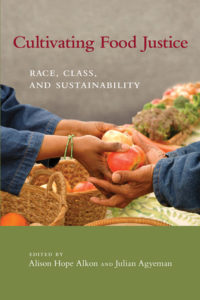What did your great-grandmother eat?
 “Feminist social scientists use the term positionality to refer to the understanding that our lived experiences, particularly those of race, class, and gender, shape our worldviews. The food movement narrative is largely created by, and resonates most deeply, with white and middle class individuals. For example, Michael Pollan’s recently offered list of food rules (2007) is intended to guide consumers toward eating practices aligned with the food movement.
“Feminist social scientists use the term positionality to refer to the understanding that our lived experiences, particularly those of race, class, and gender, shape our worldviews. The food movement narrative is largely created by, and resonates most deeply, with white and middle class individuals. For example, Michael Pollan’s recently offered list of food rules (2007) is intended to guide consumers toward eating practices aligned with the food movement.
However, when Pollan begins his first rule by telling us not to “eat anything your great-grandmother wouldn’t recognize as food,” he ignores the fact that “our” great-grandmothers come from a wide variety of social and economic contexts that may have informed their perceptions of food quite differently. Some were enslaved, transported across the ocean, and forced to subsist on the overflow from the master’s table. Others were forcibly sent to state-mandated boarding schools, in which they were taught to despise, and even forget, any foods they would previously have recognized. And those who have emigrated from various parts of the global south in the past few generations may have great-grandmothers who saw the foods they recognized demeaned, or even forbidden, by those who claimed their lands. Of course it is not these histories that Pollan intends to invoke when he urges readers to choose fruits and vegetables over processed foods. But because of his privileged positionality, Pollan fails to consider the effects of race on food access and the alternative meanings his words may hold for people of color in the United States. In this same way, whites in the food movement often simply do not see the subtle exclusivities that are woven into its narrative.
This is not to say that some of the food movement’s insights, particularly those regarding the destructive nature of industrial agriculture, are not important. Indeed, many of the authors included in this volume are supporters and consumers of local and organic food. Among us are individual and community gardeners, former farm apprentices, members of community-supported agriculture projects, and farmers market shoppers. Nevertheless, for many of us, our involvement with the food movement, along with our academic training, has contributed to the belief that the dominant narrative described earlier, compelling as it may be to some, might drown out other stories. In these additional stories, food is not only linked to ecological sustainability, community, and health but also to racial, economic, and environmental justice.
Our goal in highlighting these additional stories is not to chastise the food movement, but to work toward building a stronger and deeper critique of industrialized agriculture, which includes injustice along with environmental and social degradation. If activists in the food movement are to go beyond providing alternatives and truly challenge agribusiness’s destructive power, they will need a broad coalition of supporters. We argue that such support can best be found in the low-income communities and communities of color that have been, and are currently, most deeply harmed by the food system. But this alliance will require that the food movement reach beyond its own dominant narrative to understand the experiences and perspectives of its potential allies”.
Excerpt from ‘Introduction: The Food Movement as Polyculture’ by Alison Hope Alkon and Julian Agyeman from our book Cultivating Food Justice: Race, Class and Sustainability
Reference.
Pollan, Michael (2007). Unhappy Meals. The New York Times Magazine, January 28. http://www.michaelpollan.com/article.php?id=87 (accessed October 27, 2009).